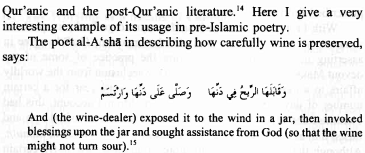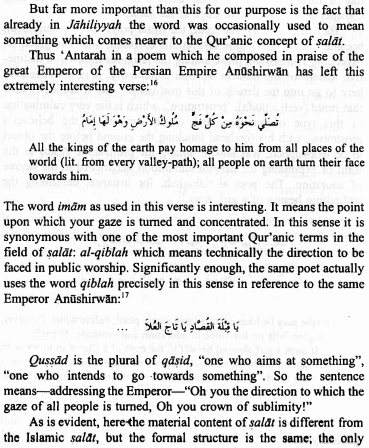|

Time Bound Protocol of Servitude and allegiance


 
-
They are the people
who heartily accept and believe in the
presence of the Unseen—not in their
sight: their Creator: Allah the Exalted.
-
And they
steadfastly maintain the Institution
of As-sa'laat: Time
Bound Protocol of Servitude and allegiance to Allah
the Exalted.
-
Further, they heartily spend some of the worldly resources
for other's welfare which Our Majesty have given them as sustenance. [only for seeking approval
and attention of Allah the Exalted]
[2:03]
Main article:
 :
Time Bound Protocol of Servitude and Allegiance:
The Key to
the door of success :
Time Bound Protocol of Servitude and Allegiance:
The Key to
the door of success
 :
It occurs 47 times, 44 times as direct object of verb; once as
object of active participle, and twice as subject noun of verb-like
particle.
It stems from Root:
ص ل و.
Basic perception infolded is to praise and magnify; express commendation, or wish
blessings upon the one who is revered; or to appreciate someone. Ibn Faris
[died 1005] in his classical Lexicon
مقاييس اللغة had quoted a verse of a poem
of pre-Qur'aan period to highlight one aspect of this Root regards
invoking blessings: :
It occurs 47 times, 44 times as direct object of verb; once as
object of active participle, and twice as subject noun of verb-like
particle.
It stems from Root:
ص ل و.
Basic perception infolded is to praise and magnify; express commendation, or wish
blessings upon the one who is revered; or to appreciate someone. Ibn Faris
[died 1005] in his classical Lexicon
مقاييس اللغة had quoted a verse of a poem
of pre-Qur'aan period to highlight one aspect of this Root regards
invoking blessings:
وقابَلَها الرِّيحُ في
دَنِّها وصلَّى
على دَنِّها وارتَسم
Learned Professor Toshihiko Izutsu
in his book: "God and Man in the Qur'aan" quoted it in his study on the
concept of this Root and word:
 :
[Quote] :
[Quote]



About the other aspect of the Root in physical realm; the
Lane's Lexicon has this entry:
صَلاً
The middle of the back of a human being and of any
quadruped: or as some say, [app. in a beast,]
the part
that slopes down from the hips, or haunches: or the
space
intervening between the
جَاعِرَة [app. meaning the hinder projection of the haunch or rump
of a beast] and the tail: or the part on the right and left of
the tail;
the two together being called [the]
صَلَوَانِ,
And
المُصَلَِّى
signifies, as applied to a horse, The one that follows next
after the foremost [at the goal]
in a race: because his head is next to the part called
صَلاً,
or next to the
صَلَوَانِ,
of the foremost. [Unquote]
For the Believers, this is the First Protocol of the Code
of Conduct:
 prescribed for them -
prescribed for them -
 the Islam. For detailed study of this Protocol, please visit:
the Islam. For detailed study of this Protocol, please visit:
 :
Time Bound Protocol of Servitude and Allegiance:
The Key to
the door of success :
Time Bound Protocol of Servitude and Allegiance:
The Key to
the door of success
The place where one stands to perform the Protocol is
called:
 Noun of place: Indefinite; singular; masculine;
accusative;
مصدر-تَصْلِيَةٌ Verbal
noun. (1)2:125=1
Noun of place: Indefinite; singular; masculine;
accusative;
مصدر-تَصْلِيَةٌ Verbal
noun. (1)2:125=1
 

-
Further be informed;
At the point in time
We appointed and declared "The House" as the place of
pilgrimage-return-assembly for the people; and as a place
of safety-shelter-amnesty:
-
We had ordered to the
effect: "you people adopt a part of standing place of
Iebra'heim [علیہ السلام] around
the House; where he stood while raising it, as
assembly place of As-sa'laat: Time
Bound Protocol of Servitude and allegiance". [Refer 2:125]
Those
who maintain and perform this Protocol are called:
 - Active
Participle: Definite; masculine; sound plural; accusative/genitive; [Form-II].
(1)70:22(2)74:43=2
- Active
Participle: Definite; masculine; sound plural; accusative/genitive; [Form-II].
(1)70:22(2)74:43=2
 
 
 
It collocates as direct object with Form-IV verbs, active
participles and verbal noun: مصدر-اِقامٌ.
The first protocol - etiquette of one's attendance before
his Sustainer Lord is to getup and stand humbly at the prescribed
timings:

 
-
You people remain
vigilant regards the plural number of As-sa'laat: Time
Bound Protocol of Servitude and allegiance; and
be vigilant for the As-sa'laat which
is relatively central to
other four Formal Timings.
-
And you people stand for
Allah the Exalted in the posture of devoted humble servants-subjects. [2:238]
Basic perception infolded in the Root:
ص ل و is to praise
and magnify; express commendation. This is done by recitation of First
Sura of Divine Discourse. The Protocol of:
 comprises of standing humbly, kneeling, prostrating and verbally
addressing, in the given words, the Sustainer Lord, Allah the Exalted.
It is thus a Gesture-speech Protocol.
comprises of standing humbly, kneeling, prostrating and verbally
addressing, in the given words, the Sustainer Lord, Allah the Exalted.
It is thus a Gesture-speech Protocol.
We stand in respectful and humble posture while
in the presence of the worldly rulers and monarchs with belief of their
superiority and humble mindset of a subject; and fear of accountability or
losing access on violation of protocols. We must consciously stand in the most
humble posture while presenting ourselves in the presence of the Mightiest
Sovereign Lord of Universes. This is the secret of success:
 
 
-
Indeed the following
of those who identify their selves as Believers have
attained perpetual success and fruitfulness: [23:01]
-
Those who
demonstrate solemnity and humble-mindedness in the performance of
their
As-Salaat: Time bound Protocol of
Servitude and Allegiance; [23:02]
Recurrences
 : Noun:
Definite; singular; feminine;
singular; accusative. (1)2:03(2)2:43(3)2:83
(4)2:110(5)2:177(6)2:277(7)4:43(8)4:77(9)4:102(10)4:103(11)4:103(12) 4:103(13)4:162(14)5:12(15)
5:55(16)6:72
(17)7:170(18)8:03(19)9:05(20)9:11(21)9:18(22)9:54(23)9:71(24)10:87(25)11:114(26)
13:22(27)14:31(28)14:37(29)17:78(30)19:59
(31)20:14(32)22:41 (33)22:78(34)24:56(35)27:03(36)
29:45(37)29:45(38)30:31(39)31:04(40)31:17(41)33:33(42)35:18(43)35:29(44)42:38
(45)58:13(46) 73:20(47)98:05=47 Break-up is as under: : Noun:
Definite; singular; feminine;
singular; accusative. (1)2:03(2)2:43(3)2:83
(4)2:110(5)2:177(6)2:277(7)4:43(8)4:77(9)4:102(10)4:103(11)4:103(12) 4:103(13)4:162(14)5:12(15)
5:55(16)6:72
(17)7:170(18)8:03(19)9:05(20)9:11(21)9:18(22)9:54(23)9:71(24)10:87(25)11:114(26)
13:22(27)14:31(28)14:37(29)17:78(30)19:59
(31)20:14(32)22:41 (33)22:78(34)24:56(35)27:03(36)
29:45(37)29:45(38)30:31(39)31:04(40)31:17(41)33:33(42)35:18(43)35:29(44)42:38
(45)58:13(46) 73:20(47)98:05=47 Break-up is as under:
  : (1)2:03(2)5:55(3)8:03(4)9:71(5)27:03(6)31:04=6
Study here : (1)2:03(2)5:55(3)8:03(4)9:71(5)27:03(6)31:04=6
Study here
  :
(1)14:31(2)98:05=2
:
(1)14:31(2)98:05=2
  :
(1)14:37=1
:
(1)14:37=1
  :
(1)2:43(2)2:83(3)2:110(4)4:77(5)6:72(6)10:87(7)24:56(8)30:31(9)73:20=9.
:
(1)2:43(2)2:83(3)2:110(4)4:77(5)6:72(6)10:87(7)24:56(8)30:31(9)73:20=9.
  : (1)4:103(2)22:78(3)58:13=3 : (1)4:103(2)22:78(3)58:13=3
  :
(1)2:177(2)9:18=2
:
(1)2:177(2)9:18=2
  :
(1)2:277(2)7:170(3)9:05(4)9:11(5)13:22(6)22:41(7)35:18(8)35:29(9)42:38=9
:
(1)2:277(2)7:170(3)9:05(4)9:11(5)13:22(6)22:41(7)35:18(8)35:29(9)42:38=9
   :
(1)4:43=1
:
(1)4:43=1
   :
(1)4:102=1
:
(1)4:102=1
  :
(1)4:103=1
:
(1)4:103=1
  :
(1)4:162=1
:
(1)4:162=1
  :
(1)5:12=1
:
(1)5:12=1
   :
(1)9:54=1
:
(1)9:54=1
  :
(1)11:114(2)17:78(3)20:14(4)29:45(5)31:17=5
:
(1)11:114(2)17:78(3)20:14(4)29:45(5)31:17=5
  :
(1)19:59=1
:
(1)19:59=1
  :
(1)33:33=1
:
(1)33:33=1
  (1)4:103(2)29:45=2
(1)4:103(2)29:45=2
 Noun:
Definite; singular; feminine;
singular; nominative. (1)62:10=1 Noun:
Definite; singular; feminine;
singular; nominative. (1)62:10=1
 Noun:
Definite; singular; feminine;
singular; genitive by conjunction. (1)2:45(2)2:153=2 Noun:
Definite; singular; feminine;
singular; genitive by conjunction. (1)2:45(2)2:153=2
  (3)2:238=1
Genitive by conjunction (3)2:238=1
Genitive by conjunction
  (1)4:101=1 (1)4:101=1
  (1)4:142(2)5:06(3)5:58=3
(1)4:142(2)5:06(3)5:58=3
  (1)5:91=1
(1)5:91=1
   (1)5:106=1
(1)5:106=1
  (1)14:40=1
(1)14:40=1
  (1)21:73=1
(1)21:73=1
  (13)24:37=1
(13)24:37=1
  (1)22:35=1
: (إضافة
لفظية)
(1)22:35=1
: (إضافة
لفظية)
    Noun:
Definite by construct; singular; feminine;
genitive. (1)24:58=1 Noun:
Definite by construct; singular; feminine;
genitive. (1)24:58=1
    (1)24:58=1
(1)24:58=1
 Prepositional phrase:
بـِ Inseparable preposition
+ Noun: Definite; singular; feminine;
singular; genitive. (1)19:31(2)19:55(3)20:132=3 Prepositional phrase:
بـِ Inseparable preposition
+ Noun: Definite; singular; feminine;
singular; genitive. (1)19:31(2)19:55(3)20:132=3
 Prepositional phrase + Possessive Phrase:
بـِ Inseparable preposition
+
Noun: Definite; singular; feminine;
singular; genitive
+ Possessive pronoun: Second person; singular; masculine; in genitive
state. (1)17:110=1
Prepositional phrase + Possessive Phrase:
بـِ Inseparable preposition
+
Noun: Definite; singular; feminine;
singular; genitive
+ Possessive pronoun: Second person; singular; masculine; in genitive
state. (1)17:110=1
  (1)6:92(2)70:23(3)70:34=3
(1)6:92(2)70:23(3)70:34=3
  Possessive
Phrase: Definite; singular; feminine;
singular; genitive
+ Possessive pronoun: Third person; plural; masculine; in genitive
state.(1)23:02=1
Possessive
Phrase: Definite; singular; feminine;
singular; genitive
+ Possessive pronoun: Third person; plural; masculine; in genitive
state.(1)23:02=1
  : (1)107:05=1
: (1)107:05=1
 Possessive
Phrase: Definite; singular; feminine;
singular; nominative
+ Possessive pronoun: Third person; plural; masculine; in genitive state
(1)8:35=1 Possessive
Phrase: Definite; singular; feminine;
singular; nominative
+ Possessive pronoun: Third person; plural; masculine; in genitive state
(1)8:35=1
 Possessive
Phrase: Noun:
Definite; singular; feminine;
accusative + Possessive pronoun: Third person; masculine; singular;
in genitive state. (1)24:41=1 Possessive
Phrase: Noun:
Definite; singular; feminine;
accusative + Possessive pronoun: Third person; masculine; singular;
in genitive state. (1)24:41=1
 Possessive
Phrase: Noun:
Definite;
singular;
feminine;
accusative
+ Possessive pronoun: First person; singular; masculine, in genitive
state. (1)6:162=1 Possessive
Phrase: Noun:
Definite;
singular;
feminine;
accusative
+ Possessive pronoun: First person; singular; masculine, in genitive
state. (1)6:162=1
 Prepositional Phrase: Inseparable Preposition + Noun: Definite;
feminine;
singular; genitive.(1)62:09=1
Prepositional Phrase: Inseparable Preposition + Noun: Definite;
feminine;
singular; genitive.(1)62:09=1
 Possessive
Phrase: Noun: Definite; feminine;
singular; accusative + Possessive pronoun: Second Person; masculine;
singular, in genitive state. (1) 9:103=1 Possessive
Phrase: Noun: Definite; feminine;
singular; accusative + Possessive pronoun: Second Person; masculine;
singular, in genitive state. (1) 9:103=1
 Interrogative
particle + Possessive Phrase: Noun:
Definite; masculine; singular; nominative + Possessive pronoun: Second
Person; masculine; singular, in genitive state. (1)11:87=1 Interrogative
particle + Possessive Phrase: Noun:
Definite; masculine; singular; nominative + Possessive pronoun: Second
Person; masculine; singular, in genitive state. (1)11:87=1
 Noun: Indefinite; plural; feminine;
nominative. (1)2:157(2)22:40=2
Noun: Indefinite; plural; feminine;
nominative. (1)2:157(2)22:40=2
  :(1)23:09=1 :(1)23:09=1
  (1)2:238=1 (1)2:238=1
  Noun:
Indefinite; plural; feminine;
accusative.
(1)9:99=1 Noun:
Indefinite; plural; feminine;
accusative.
(1)9:99=1
 Prepositional Phrase: Inseparable Preposition + Active
Participle: Definite; masculine; sound plural; genitive; [Form-II].
(1)107:04=1 Prepositional Phrase: Inseparable Preposition + Active
Participle: Definite; masculine; sound plural; genitive; [Form-II].
(1)107:04=1
 


 
 
-
Thereby, regret and vow
is the eventuality for certain
performers of As-sa'laat: Time
bound protocol of servitude and allegiance—
[107:04]
-
Who are neglectful
and heedless of their Sa'laat—[107:05]
-
Who
occasionally come for it only feigning to people; [107:06]
-
And they cause hindrance
even in freely-ordinarily
available things of public use and refuse giving trivial value things to
others. [107:07]
Progressive number of grammatical units:
= 13,469 + 47 = 13,516

 Home
00031.
 Prepositional Phrase -some/part of that which
Prepositional Phrase -some/part of that which
|


